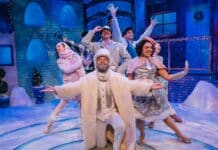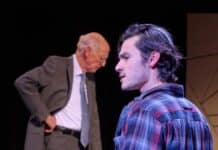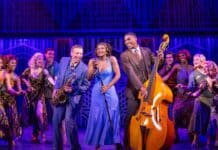In their online videos discussing Merry Wives on Shakespeare Theatre Company’s website, playwright Jocelyn Bioh and director Taylor Reynolds speak of wanting to convey the “joy” and “vibrancy” of the varied African diaspora community in contemporary South Harlem. Bioh’s adaptation of Shakespeare’s The Merry Wives of Windsor hits those marks in every respect.
The vibrancy is striking even before the play begins, as the audience sees Lawrence E. Moten III’s multilevel set, depicting in loving detail the New York City block where the characters live and work: streetlights, fire escapes, apartment windows with colorful curtains, a subway entrance. Sound designer/composer Mikaai Sulaiman’s rich, lively, pre-show music sets the mood for the action to come. Then dancer/ensemble member Shaka Zu invites the audience into the community with his turn on a downstage drum.
The Shakespeare play, at least in some productions I have seen, can have a sharp, mean-spirited edge, playing as a comedy of revenge and humiliation. In Reynolds’ direction of Bioh’s adaptation, the tone is far warmer. The merry wives here — delightfully played by Felicia Curry, as Madam Nkechi Ford, and Oneika Phillips, as Madam Ekua Page — are having so much fun in their own lives that even the subjects of their pranks can ultimately appreciate the humor. As Mama Quickly, Kelli Blackwell is the community’s glue; nothing gets by her, and she has an often-gleeful hand in everything.
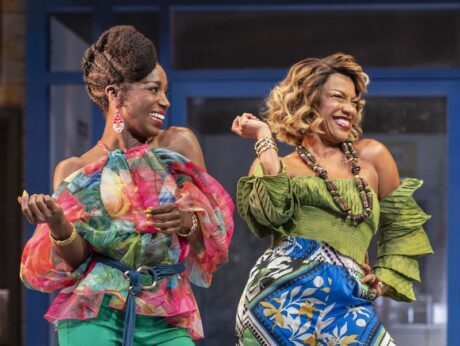
Most of the men are fools of one sort or another. The fool in chief, of course, is Falstaff (Jacob Ming-Trent), who, against all evidence and despite repeated reversals, insists on thinking himself not only clever but God’s gift to the ladies. His is the comedy of cluelessness. Ming-Trent’s most memorable moment comes when, having been dumped in the river in a laundry cart, Falstaff emerges bedraggled from a subway exit, bemoaning but not quite understanding what has befallen him.
Mister Nduka Ford (Nick Rashad-Burroughs) is unduly, and of course, unjustifiably, jealous concerning his wife, and the merry wives have plans for him as well. His funniest moments are when he appears in an absurd disguise as Brook, seeking to sniff out Falstaff’s designs on his wife. The self-absorbed Dr. Caius (Jordan Barbour), Pepé Le Pew–adjacent accent and all, seeks to marry the uninterested Anne Page (Peyton Rowe), daughter of Madam Page and her husband, Mister Kwame Page (JaBen Early), the play’s closest approach to a sensible man, who knows better than to be jealous of his wife.
Neither the Shakespeare original nor Bioh’s adaptation is a vehicle for subtlety or introspection. Under Reynolds’ fast-paced direction, the actors’ performances are large-scale and active, both physically and vocally, with moments of slapstick. Movement and dance are a major feature of the production (Ashleigh King was the choreographer), producing memorable moments. Curry’s solo dance in the laundromat is one, and the final scene in the park — where virtually the entire community, moving in spectacular traditional masks and costumes, confound Falstaff once more — is the theatrical highlight of the evening.
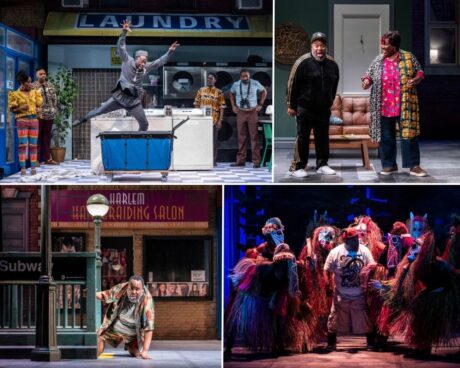
Ivania Stack’s costume designs are a marvel of color and flow, suiting the characters and the cultures from which they come. They can be stunningly beautiful, like Madam Page’s gown toward the end of the show, or sexy, or intentionally ridiculous, like Falstaff’s when he sets out on his foredoomed mission of seduction. One sweet exception to the overall exuberance of the design is Stack’s costuming for Fenton (Latoya Edwards), Anne Page’s true love. Fenton is a sincere, straightforward character, who, alone in the play, is neither the perpetrator nor the victim of pranks. Fittingly, her costumes are quieter than most. The costuming is far too varied and interesting to be described. It needs to be seen.
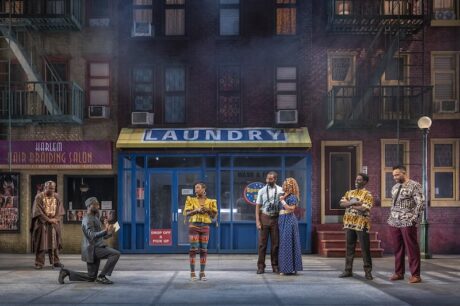
The vibrancy in the acting and physical production is remarkable. But it is the joy of the piece — “Black joy” as Reynolds calls it in her video, to be sure, but infectious joy to anyone who sees the show — that is paramount. It is the joy of people coming together in a community, embracing everyone, be they lovers or merry wives or fools. During a time — and a week — when we need all the joy and sense of community we can get, Merry Wives is a must-see highlight of the early DC theatrical season.
Running Time: One hour and 50 minutes, with no intermission.
Merry Wives plays through October 5, 2025, presented by the Shakespeare Theatre Company at Sidney Harman Hall, 610 F Street NW, Washington, DC. Tickets ($39 —$190) are available at the box office, online, by calling (202) 547-1122, or through TodayTix. Shakespeare Theatre Company offers discounts for military servicepeople, first responders, senior citizens, young people, and neighbors, as well as rush tickets. Contact the Box Office or visit Shakespearetheatre.org/tickets-and-events/special-offers/ for more information. Audio-described and captioned performances are also available.
The Asides program for Merry Wives is online here.
COVID Safety: All performances are mask-recommended. Read more about STC’s Health and Safety policies here.
Merry Wives
By William Shakespeare
Adapted by Jocelyn Bioh
Directed by Taylor Reynolds
SEE ALSO:
Shakespeare Theatre Company announces cast and creative team for ‘Merry Wives’ (news story, July 31, 2025)

